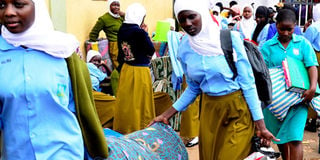Covid-19: Teachers worried over high school dropouts

Students carry their belongings after schools were ordered to close on March 19 following the outbreak of Covid-19. PHOTO/FILE
What you need to know:
Government is encouraging virtual learning via TV and radio during the lockdown. It has also distributed learning materials for those that could not access TV and radio.
The Uganda National Teachers Union (Unatu) has said the current lack of engagement of key stakeholders in the education sector during the coronavirus lockdown could result in some children never returning to school.
“By the time we reopen, many learners will not be able to return to class. If learners are not practically engaged, some of them will forget about learning, begin doing other things and move on with their lives,” Mr Filbert Baguma, the Unatu chairperson, told Daily Monitor yesterday.
The teachers’ union asked the Ministry of Education to come up with a budget that addresses lockdown challenges and emerging issues in the sector.
On Monday, UNICEF released a report indicating that “some 9.7 million children worldwide could be forced out of school forever” by the end of the year as a result of increasing poverty and budget cuts incurred by the Covid-19 pandemic.
Mr Baguma said there is no clear data at the moment to ascertain how many children may never return to school after the lockdown.
“We seem not to be doing much in capturing data to have an analysis to inform the reopening of schools and other institutions. By now, we should be knowing that for schools to reopen, this is the available infrastructure in such and such schools,” he said.
“We could then have options for how to slowly reopen schools even if having children learn in shifts of three days a week so that we have real contacts and engagements with learners,” Mr Baguma added.
Government is encouraging virtual learning via TV and radio during the lockdown. It has also distributed learning materials for those that could not access TV and radio.
But Mr Baguma said the home schooling method is not effective.
“It is not viable to rely on these lessons because it is difficult to assess who is and who is not learning. We have not seen sensitisation and preparation of the parents, learners and the teachers,” he said.
He added: “By the time we reopen, some will have gone into petty businesses, others will already be married off. So to avoid this, we need to have something being re-echoed on a daily basis about the education of the children as we look at a nearby date to go back to school. But when we keep quiet, it looks like it is a closed chapter.”
Efforts to get a comment from the Ministry of Education was futile by press time. Mr Alex Kakooza, the Permanent Secretary, said he was chairing a meeting while the spokesperson, Mr Patrick Muinda, said he needed to consult before he could comment.
According to the Education ministry, more than 15 million school going children were sent home in March and to date, government is still exploring safe options for school reopening. Last month, Centre for Health, Human Rights and Development (CEHURD) petitioned the Speaker of Parliament, over growing concerns of teenage pregnancies during the coronavirus lockdown.
Speaker’s concerns
Last month, Centre for Health, Human Rights and Development (CEHURD) petitioned the Speaker of Parliament, Ms Rebecca Kadaga, over rising cases of teenage pregnancies during the coronavirus lockdown. “I was informed by CEHURD’s Fatia Kiyange of the spike in pregnancy among young girls in Luuka and Kaliro districts during the pandemic; that 60 learners aged 14 and 15 were pregnant and likely to miss school,” Ms Kadaga tweeted.



